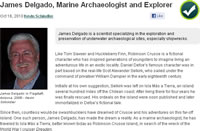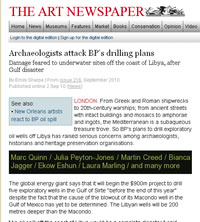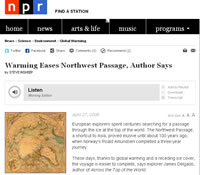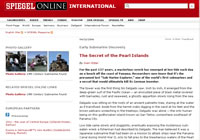Jim has been interviewed by the media since early in his career. Below are selected interviews on various subjects.
Here are selected pieces.
Excerpts: When engineers working near Candlestick Park last March drilled deep into the ground for soil samples, they pulled up chunks of wood and figured it was an old pier.
They had no idea it was a century-old ship, let alone two.
“… These were the flatbed trucks of San Francisco Bay from the late 19th and early 20th century,” said Jim Delgado, director of maritime heritage at the National Oceanic and Atmospheric Administration in Washington, D.C. “They’re largely forgotten now, but these scow schooners moved the goods that built the city and the Bay Area economy.”

James Delgado, Marine Archaeologist and Explorer
Excerpt: Delgado combines the details of archaeology, respect for history, and thrill of diving to explore and understand shipwrecks and their long-lost secrets. “What really keeps me fired up with a passion for the past are the connections to everyday people like you and me. Often, it’s an unidentified wreck or the mute evidence of a life forever interrupted that moves me, and grounds the scientist in the firm reality of the human condition.”

Archaeologists attack BP’s drilling plans
Excerpts: From Greek and Roman shipwrecks to 20th-century warships; from ancient streets with intact buildings and mosaics to am phorae and ingots, the Mediterranean is a subaqueous treasure trove. So BP’s plans to drill exploratory oil wells off Libya has raised serious concerns among archaeologists, historians and heritage preservation organisations.
…“There is a complete record of thousands of years of history on the bottom of the Mediterranean,” said Delgado.
…According to Delgado advance seismic surveys are the key to protecting these sites: “The [oil] industry already does this, especially in the Gulf. The other safety measures I would like to see are, I am sure, ones the oil and gas industry would also like to see” he said, adding that many of these measures are already being applied. “The Gulf spill was not beneficial to BP on many fronts, albeit it was a rare accident. I cannot believe they want to see a repetition.”

Warming eases Northwest Passage author says
(Audio version available as well at the link above.)
Excerpt: European explorers spent centuries searching for a passage through the ice at the top of the world. The Northwest Passage, a shortcut to Asia, proved elusive until about 100 years ago, when Norway’s Roald Amundsen completed a three-year journey.
These days, thanks to global warming and a receding ice cover, the voyage is easier to complete, says explorer James Delgado, author of Across the Top of the World.
In 2000, with a decidedly smaller, modern craft — an aluminum catamaran — it took Delgado’s team just six weeks to go through the Northwest Passage.
“A lot of people thought we’d be crushed like a beer can in the ice,” he says. “But no, the Northwest Passage has had its fangs pulled.”

Early Submarine Discovery – The Secret of the Pearl Islands
Excerpts: For the past 137 years, a mysterious wreck has emerged at low tide each day on a beach off the coast of Panama. Researchers now know that it’s the presumed lost “Sub Marine Explorer,” one of the world’s first submarines and a vessel that would ultimately kill its German inventor.
…Without any equipment, and wearing nothing but boxer shorts, Delgado swam out to the mysterious wreck. He cursed when he scraped his left leg on the sharp-edged metal — and because he didn’t have a measuring tape to document the object’s exact dimensions. The size, shape and condition of the chambers corresponded to none of the vessels he was familiar with — and Delgado thought he knew just about everything that had ever floated. But this craft’s technology seemed much more modern than that of the “Hunley.” The shape of the hull was more reminiscent of the fantasy forms he’d seen in old science fiction books. Why on earth, he wondered, had he never heard about this vessel?
